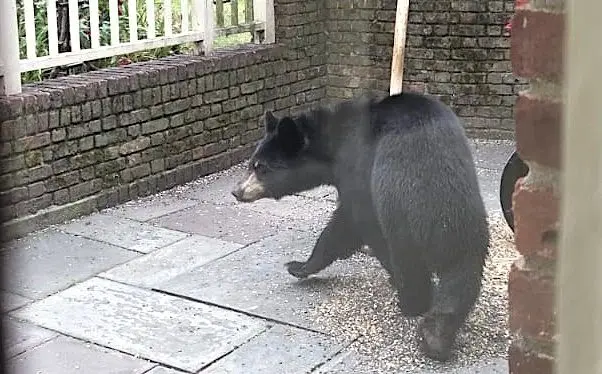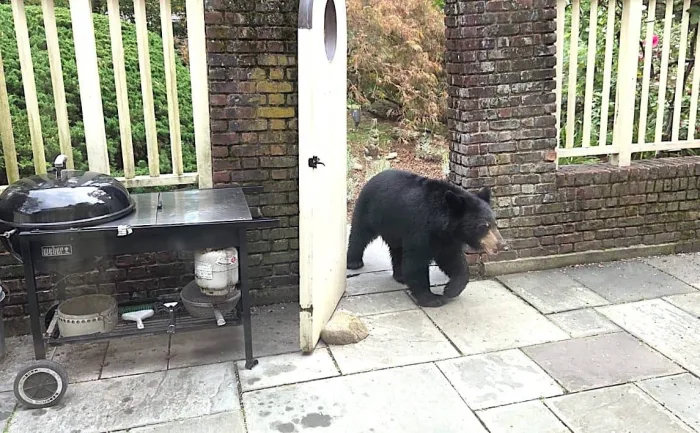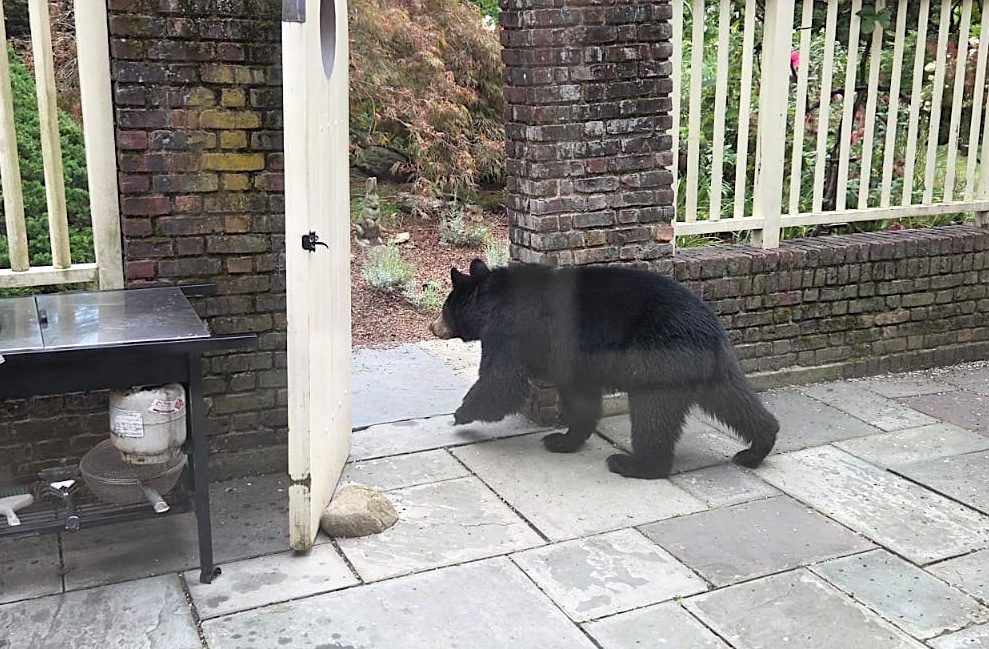The bear didn’t knock. He didn’t wait for an invitation. On a quiet Sunday afternoon in Greenwich, he strolled up the driveway of Leora Levy’s home, turned a bird feeder into what she later called “modern sculpture,” and stayed for three hours.
“It was just after two o’clock,” Levy recalled. “I was headed to meet my husband at our boat, the dogs already in the car with the engine running and the air conditioning blasting. I came out of the garage, closed the door, and there he was—right by the driver’s side of my car.”
One dog barked frantically from inside. Levy screamed, jumped into the passenger seat, and clambered over to the driver’s side. “The bear looked at me like I was crazy,” she said, “and walked up the back steps toward the kitchen door.”
What followed was less nature documentary and more neighborhood spectacle. Her son, David, returning home, found the bear still there. “He turned our bird feeder into modern sculpture, and he knocked over the metal trash can where I kept the bird seed,” Levy said. “I had two bricks on top to keep raccoons out. That did not stop the bear.”
By the time Levy returned around 5 p.m., the visitor had finally departed. But the aftermath lingered: scattered birdseed, crushed trash can, and a heightened sense of awareness in the neighborhood.
The bear wasn’t done with the area. It was later spotted on Pecksland Road, Wildflower Trail, and Zaccheus Mead Lane, part of a growing trend of bear sightings in Greenwich and throughout Fairfield County.
First Selectman Fred Camillo followed up with Levy several times during and after the incident to be sure she and her family were alright.
Police Chief James Heavey confirmed that officers were ready to respond if the bear posed an immediate threat and emphasized that residents should treat all bear encounters with caution. “If you see a bear, don’t approach it,” Heavey said. “Call us if there’s an immediate danger or the bear is being aggressive, but call DEEP if there is no immediate threat.”
 The Connecticut Department of Energy and Environmental Protection (DEEP) notes that black bears are becoming more common in suburban areas. They are opportunistic feeders, drawn to bird seed, garbage, compost, pet food, and fruit trees. Residents can take practical steps to reduce the chance of attracting them:
The Connecticut Department of Energy and Environmental Protection (DEEP) notes that black bears are becoming more common in suburban areas. They are opportunistic feeders, drawn to bird seed, garbage, compost, pet food, and fruit trees. Residents can take practical steps to reduce the chance of attracting them:
Secure garbage in airtight or bear-resistant containers, ideally kept inside a garage or shed until pickup day.
Take down bird feeders from late March through November and clean up spilled seed.
Do not leave pet food outside. Feed pets indoors and bring in leftovers immediately.
Keep grills clean and stored inside when not in use.
Supervise pets at all times when outdoors.
Avoid composting meat or sweet foods such as fruit peels.
Make noise if surprised by a bear. Clap, shout, or bang objects to encourage it to leave.
Sightings should be reported to the Greenwich Police Department’s non-emergency line at (203) 622-8004 or to the DEEP Wildlife Division at (860) 424-3011. Residents may also submit bear sightings online through DEEP’s reporting portal, providing details such as ear tags or behavior.
In the rare case of aggressive behavior, DEEP’s Environmental Conservation Police should be contacted through their 24-hour emergency line at (860) 424-3333, or by calling 911 if the threat is immediate.
For Levy, the experience was unforgettable but not catastrophic. “He wasn’t aggressive,” she said. “He wanted the bird seed.” Still, she has adapted. “I have rags soaked in vinegar around the bird feeder—they don’t like the smell. And I use a frying pan lid and a metal spoon to make noise when I go outside.”
It’s a new rhythm of suburban living in Greenwich, where neighbors now share lawns not just with squirrels and chipmunks but with black bears, too.






